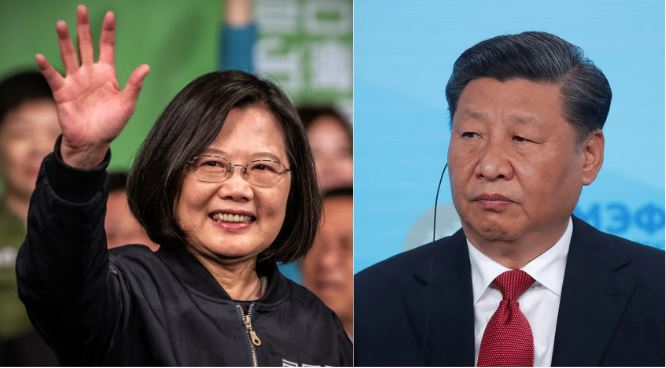Taiwan, the island nation which China wants to gobble up, has been unsuccessfully trying to lure its companies to return from China. Thousands of companies from the rich island nation have set up manufacturing units in China, given low labour costs. These companies, despite successive efforts of Taiwanese governments, were not ready to leave China as they had no efficient alternatives.
But, in the last few years, many factors went against China’s position as a pre-eminent manufacturing destination. The United States, the largest market for the goods manufactured in China by Taiwanese companies, has imposed heavy tariffs on Chinese manufactured goods. Moreover, labour costs have almost doubled in many Chinese cities in the last few years.
Capitalizing on these factors, Tsai Ing-wen, the charismatic Taiwanese leader who was elected in May 2016, doubled down the efforts to bring the manufacturing units back home, or any other “friendly country”. The tensions between Beijing and Taipei have only increased since the election of a fiercely nationalistic Tsai Ing-wen as President.
In March 2019, Taiwan announced a financial package and various other incentives for the companies which were wishing to move factories outside China. As per a report by SCMP, the Taiwanese government offered “Preferential financing, permission to hire low-cost workers from Southeast Asia and the prospect of letting mainland Chinese employees to work in Taiwan to returning investors” and “Some projects also qualify for rent breaks on government-owned land, which is normally hard to find for large-scale investments.”
Amid the favorable conditions due to American tariffs and rising wages in China, the policy to incentivize companies for leaving China started working in favor of the island nation.
Cross-strait trade was around 150 billion dollars in 2016, which has started to come down significantly in the last few years. Take the example of Foxconn, one of the largest Taiwanese manufacturers, which has more than half of its production capacity based out of China.
But, after the US imposed heavy tariffs on goods manufactured in China and companies like Apple for whom it manufactures products requested it move the manufacturing units out of Chinese borders, the company set up assembling units in India. In the last few years, its operations in India have increased exponentially. “Twenty-five percent of our production capacity is outside of China, and we can help Apple respond to its needs in the U.S. market,” Liu Young, the new chairman of the company said, according to Bloomberg. “We have enough capacity to meet Apple’s demand.”
So far, Taiwan has been the biggest beneficiary of the exodus of manufacturing units from China. Its own companies that have factories in China, as well as high-tech American companies like Google, have started shifting their companies to Taiwan. As per a report by Nikkei Asian Review, one of the premier business newspapers of East Asia, under the government incentive program, the Taiwanese high-tech companies have planned to invest 25 billion dollars in their own country to build new factories at home instead of China.
As per various reports, the US-China trade war has boosted office rent in Taiwan as the companies started shifting to the island country. Since the US-China trade war, American tech companies- Facebook, Google, Apple- have invested billions of dollars in Taiwan and opened up new offices in the country. Tony Chao, managing director at property consultancy Jones Lang LaSalle Taiwan, said, “Relative to the rest of the region, Taiwan is a democratic place with rule of law, and steady electric supply, with talent in the high tech sectors” making it attractive to tech investments.
Taiwan registered positive economic growth in the first quarter of this calendar year as all other East Asian economies shrank, thanks to investment in new projects. The economic growth of the island country was 1.54 percent in the first quarter. The trend to return back to the home country is strongest in Japanese and Taiwanese companies, reported Nomura. This is because the staunch nationalist government in both countries have resolved to punish China economically for the border issues by incentivizing companies returning back home or moving to any other “friendly” country.
Last year, Taiwan approved 156 new investment projects, many relocating or adding capacity in the island country to avoid American tariffs. This year, as the anti-China sentiment across the world has heated up due to Coronavirus, more and more businesses would relocate.
Economic cooperation Framework Agreement, a kind of FTA signed between Taiwan and China in 2010 for 10 years, is being dumped by Taiwan as the agreement term expires by September this year. “It’s rather hard to imagine that ECFA will be canceled but because China-Taiwan relations are very poor now and there’s no more of the earlier political foundation for negotiating ECFA,” said Huang Kwei-bo, vice dean of the international affairs college at National Chengchi University in Taipei.
The Coronavirus disease is set to prove the final nail in the coffin of globalization, especially China-centric globalization. After the Coronavirus pandemic is over, the companies as well as workers would avoid any business with China, given the massive psychological resentment against the country due to the virus. At the same time, the governments would incentivize the companies to relocate because they want to fill up for the massive job losses due to the recession.
China’s rise in the last few decades was due to its manufacturing prowess, but with the rise in income (China has become middle-income country with per capita GDP five times to that of India), labour is getting costlier and the companies were already looking to relocate. The Coronavirus-induced recession would give them a final push to relocate to their own country or other countries with cheaper labour like India, Vietnam.
